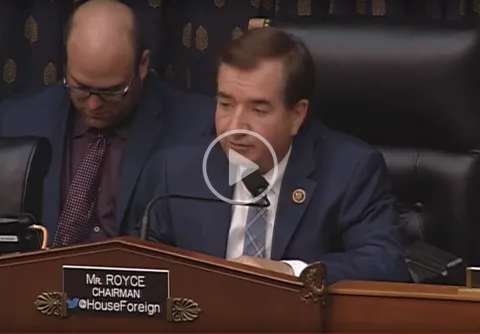8 Key Points on President Obama's Plan to Close the Terrorist Prison at Guantanamo Bay
March 24, 2016
Yesterday, the House Foreign Affairs Committee questioned two top administration officials at the Department of State and Department of Defense charged with overseeing the president's push to empty out the terrorist prison at Guantanamo Bay before he leaves office.
Here are 8 key takeaways from the hearing:
- Bringing terrorists held at GITMO to the United States is still against the law. Chairman Royce: Secretary of Defense Carter and Attorney General Lynch have both stated that transfers of Guantanamo detainees to the United States are legally prohibited. Is that your understanding of the law as well?Mr. Wolosky: It is my understanding of the law that the statute in its current form prohibits transfers to the United States.
- It won't deter ISIS. Rep. Trott: So if we move the detainees to U.S. soil, that's not going to be used as a recruitment tool by ISIS? They're going to go silent now that we've ‘done right by our allies?'Mr. Lewis: It still will be a tool.
- Instead, it would likely result in more threats to the U.S. homeland. Chairman Royce: If you move them to U.S. soil, in fact that will be a magnet for terrorists—the fact that jihadists are being held in the United States.
- In its rush to empty out the terrorist prison, the Obama administration is being less than straightforward with foreign countries.
Chairman Royce: The top State Department official overseeing Guantanamo at the time wrote to the President of Uruguay that there was no information about these 6 that they were involved in conducting or facilitating terrorist activities against the United States or its partners or allies. No information? They were known to have been hardened al-Qaeda fighters involved in forging documents, trained as suicide bombers, fighting at Tora Bora, committing mayhem, committing murders in Afghanistan.Image

- Making matters worse, the Obama administration is releasing detainees to countries that don't have the capability or the intent to keep them from returning to the terrorist battlefield. Chairman Royce: "But the fact is [Ghana] doesn't have top-notch intelligence or law enforcement services to deal with this kind of problem. The GDP per capita is like $4,000. It's 175th in the world. The fact is that their leaders have many, many challenges in Ghana facing them every day."So I'm going to guess that tracking and monitoring former Guantanamo detainees isn't a priority, just as it wasn't in other examples that I've…laid out for you, like Uruguay."
- And, in some cases, the Obama admin doesn't know the key foreign officials charged with mitigating threats posed by these terrorists.
Rep. Smith: And if a government has a person walking point on a particular issue, like this one, and it happens to be this Minister of Interior, I think we would want to know whether or not he is a person who can be trusted. Particularly with such people who have committed terrorism, and may recommit.Mr. Wolosky: Well again, as I've said, I have not met him, so I feel uncomfortable offering a personal assessment.Image

- According to the Obama administration's own figures, more than 30 percent of released detainees have returned to the terrorist battlefield.
Chairman Royce: "The overall number is in the neighborhood of 31 percent."And if we begin to focus on some of the recent examples of those who did, it is -- it is pretty concerning, given Ibrahim al-Qosi -- he was one of the high-risk detainees, transferred by this administration. And by 2014, he had joined Al Qaida in the Arabian Peninsula. And now he is in their leadership. And last month, we saw a video urging a takeover in Saudi Arabia."Image

- Some of these terrorists have returned to killing Americans. Rep. Rohrabacher: How many lives have been lost by those terrorists who went back to their terrorist activities? American lives.Mr. Lewis: I can talk about that in a classified setting, but…Rep. Rohrabacher: Oh, classified? So, is it over ten?Mr. Lewis: Sir, what I can tell you is, unfortunately, there have been Americans that have died because of GITMO detainees.